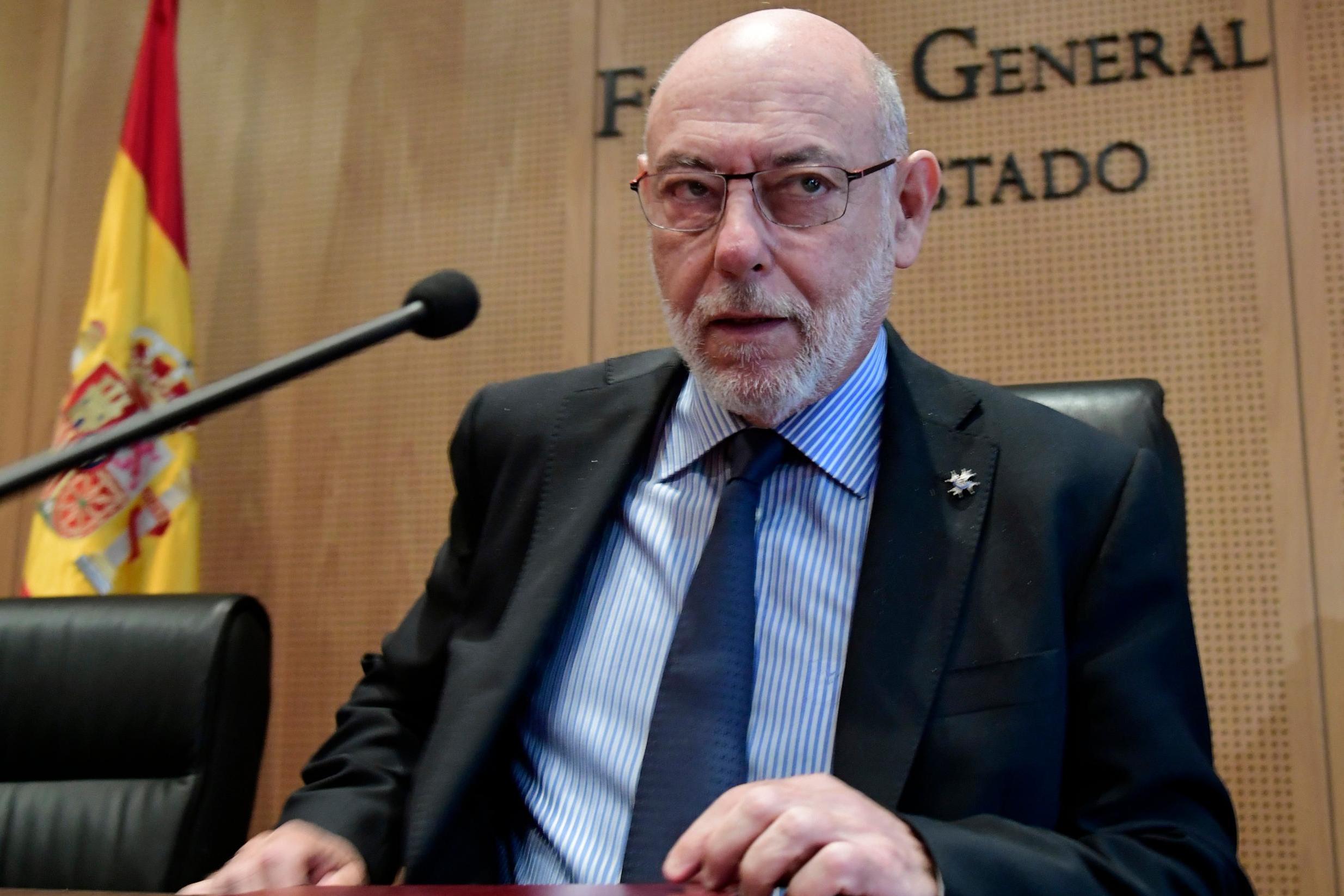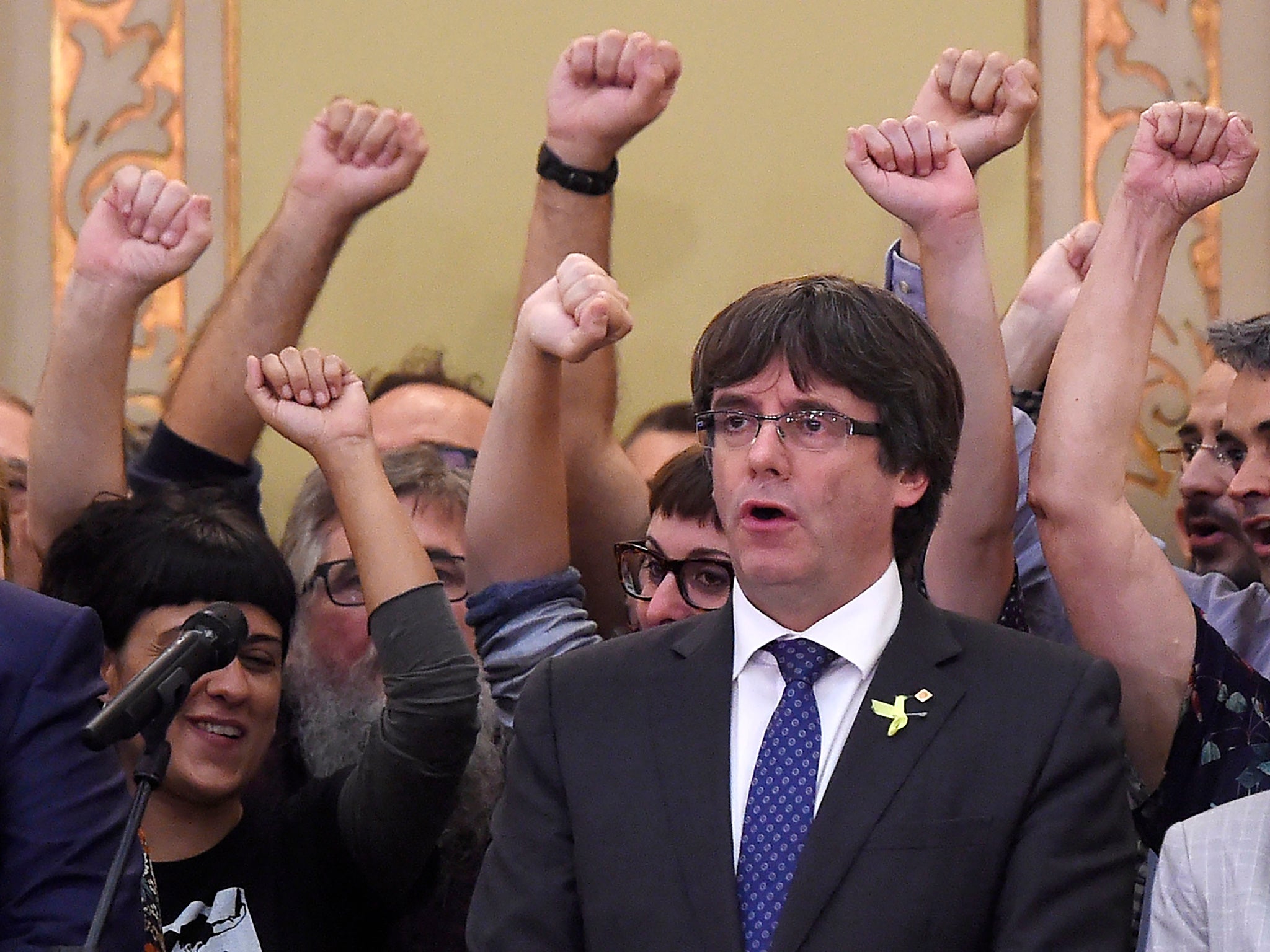Catalonia independence: Spanish state prosecutor says Catalan leaders will be charged with rebellion, sedition and misuse of public funds
Prosecutor stops short of calling for immediate arrest of Carles Puigdemont and his cabinet amid rising tensions following independence vote
Your support helps us to tell the story
From reproductive rights to climate change to Big Tech, The Independent is on the ground when the story is developing. Whether it's investigating the financials of Elon Musk's pro-Trump PAC or producing our latest documentary, 'The A Word', which shines a light on the American women fighting for reproductive rights, we know how important it is to parse out the facts from the messaging.
At such a critical moment in US history, we need reporters on the ground. Your donation allows us to keep sending journalists to speak to both sides of the story.
The Independent is trusted by Americans across the entire political spectrum. And unlike many other quality news outlets, we choose not to lock Americans out of our reporting and analysis with paywalls. We believe quality journalism should be available to everyone, paid for by those who can afford it.
Your support makes all the difference.Spain's state prosecutor has called for Catalonia's leaders to be charged with rebellion, sedition and misuse of public funds over their push for independence.
Attorney-General Jose Manuel Maza said he had filed two lawsuits seeking the prosecution of the ousted Catalan cabinet and the regional parliament amid mounting tensions following this month's referendum.
The independence vote, called illegal by judges in Madrid, triggered Spain's biggest constitutional crisis for decades.
Spain's Prime Minister Mariano Rajoy assumed direct control of the region on Friday, sacked its secessionist government and called a snap election for 21 December.
Catalonia had earlier declared independence from Spain less than an hour before a vote in the country’s Senate gave Madrid the power to seize the region’s autonomous powers.
Some of the most prominent members of the Catalan administration, including its president Carles Puigdemont and vice-president Oriol Junqueras, have pledged to defy Madrid and said only the people of Catalonia could dismiss them.
They could face decades in prison if prosecuted. Charges of rebellion, sedition and misuse of public funds carry maximum jail terms of 30, 15 and six years respectively.
Under Spain's legal system, the state prosecutor's request for charges will go to judges for consideration. Mr Maza has asked judges to call the secessionist leaders to testify.

He said he had also requested preventive measures against the officials, but did not specify if that meant their immediate arrest or being remanded in custody ahead of a trial.
One lawsuit seeks charges for ousted Catalan officials including Mr Puigdemont and Mr Junqueras in the country's National Court. The second targets members of the governing body of Catalonia's parliament, which allowed the referendum to go ahead, was filed in the country's Supreme Court.
Some elected officials in Spain, including regional lawmakers, enjoy a degree of immunity before courts and can only be tried in the highest court.
Mr Maza spelled out the charges during a brief appearance before media in Madrid and took no questions from reporters.

His announcement came on the morning Catalans returned to work as normal on Monday despite calls from secessionist politicians for widespread disobedience.
Pro-independence groups had urged public sector workers such as teachers, firefighters and the police to refuse orders from the central authorities.
But most employees started their working day at 9am (8am GMT) as normal on Monday and there was no sign of widespread absenteeism.
The Spanish government said it was giving time to the members of the ousted Catalan cabinet to take their personal belongings from official buildings but warned they would face criminal charges if they attempt to perform any official duties.
One member of the ousted Catalan cabinet defied his sacking by showing up at work and posting a photo on social media in his office.
Josep Rull, who was the region's head of territorial affairs, tweeted said: "In the office, exercising the responsibilities entrusted to us by the people of Catalonia."
Two police officers entered and left the building in central Barcelona, followed by Mr Rull himself minutes later, who told reporters and supporters that he would continue carrying out his agenda.
Catalonia's dismissed deputy president on Sunday said he rejected what he described as a "coup d'etat" by the Spanish government.
Mr Junqueras insisted "the president of the country is and will remain Carles Puigdemont."
Catalan separatist politicians were holding meetings in Barcelona on Monday with their eyes set on a regional election in less than two months. The 21 December vote was called by Spain's central government to try to end a push for independence.

The two political parties in the separatist coalition that ruled until last week were holding separate meetings.
Some of the deposed members of the Catalan cabinet are attending the meeting at the PDeCAT headquarters in central Barcelona, but there was no sign of ousted regional leader Carles Puigdemont, who was reported to have travelled to Brussels.
Mr Junqueras, and regional parliamentary Speaker Carme Forcadell, who still symbolically holds her post, have joined the meeting of the Catalan Republic Left party.
Neither party has clarified if its plans to run in the election, which would imply acknowledging that an independence declaration last week was symbolic. They need to submit plans by 7 November and a full list of candidates by 18 November if they want to renew the coalition.
Spanish media said Mr Puigdemont had travelled to Brussels with by a number of other members of his government and would relesae a statement later on Monday.
Belgium's foreign affairs minister Theo Francken has sugggested the Catalan leader could seek asylum in the country.
Tens of thousands of anti-independence protesters lined the streets of Barcelona at the weekend chanting “long live Spain" and “prison for Puigdemont”.
Political parties opposing secession from Spain had a small lead in an opinion poll published on Sunday, the first since the the dismissed president declared independence on Friday.

Join our commenting forum
Join thought-provoking conversations, follow other Independent readers and see their replies
Comments